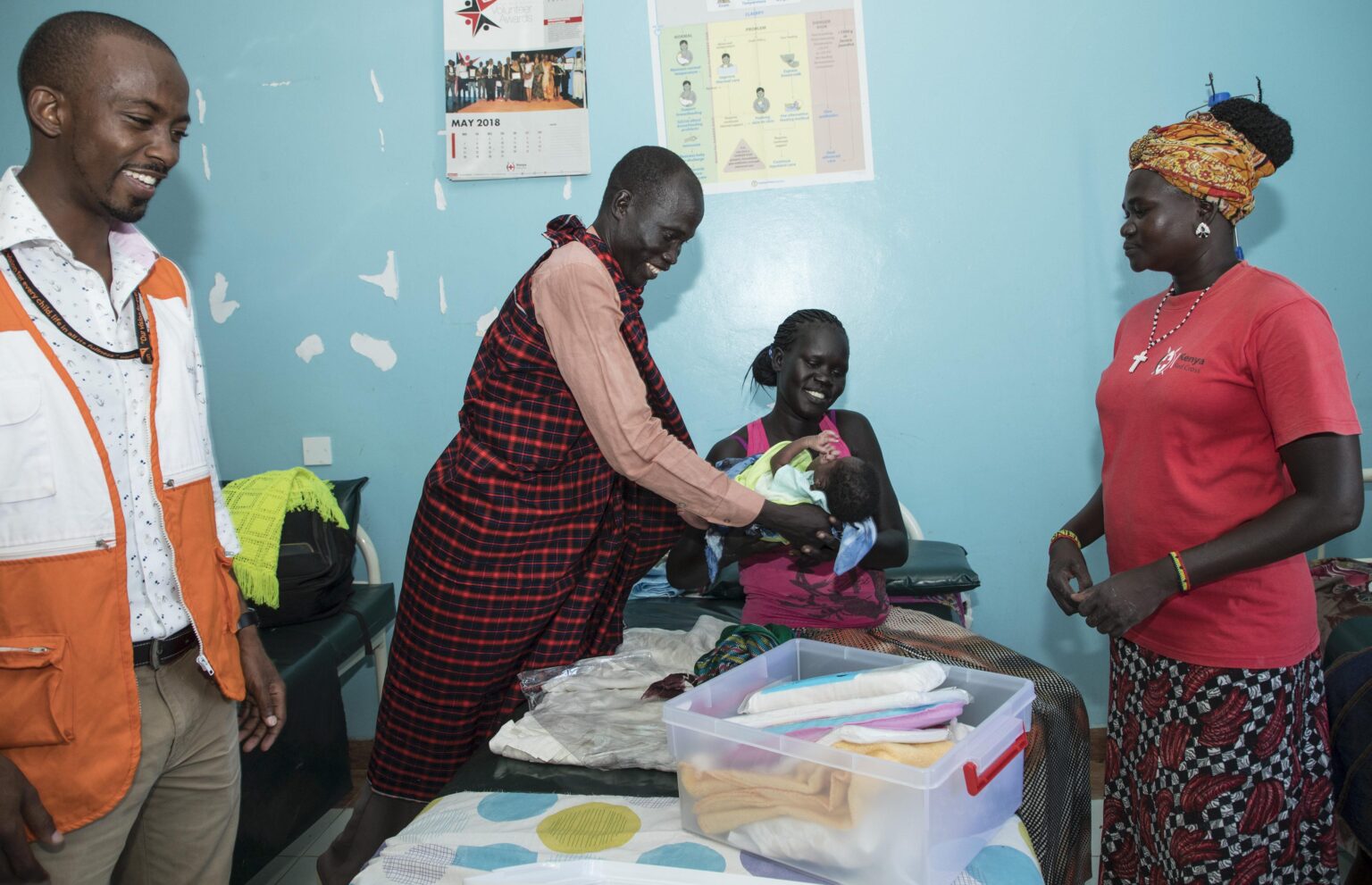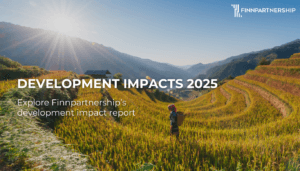Five Finnish companies doing business in developing countries: partnerships with UN organisations and NGOs

More and more companies and organisations are working together to combine the promotion of sustainable development goals with profitable business. What does a successful partnership require?
UN member states have agreed on a set of Sustainable Development Goals (SDGs) to guide efforts to eradicate extreme poverty and achieve sustainable development by 2030. The 17th goal is cooperation, as achieving these ambitious goals will require not only governments but also the private sector and civil society.
More and more Finnish businesses and NGOs are also interested in such cooperation. Companies and organisations that have received Finnpartnership’s Business Partnership Support for their projects tell us what successful partnerships require and what development impact they can achieve.
Maternity kits for refugee camps
Textile company Logonet Oy has long supplied products for the Finnish maternity kit. Together with World Vision Finland, the company set out to develop a similar package for the harsh conditions in refugee camps in the Turkana region of northern Kenya.
“Logonet’s approach is to introduce maternity kits as part of child and maternal health projects in developing countries,” says Mika Roini, the company’s development director.
“World Vision has local expertise and good links with other organisations and authorities. We could not have imagined that we would have appraoched purely ourselves the health authorities in the Turkana region,” says Roini.
The maternity kit is given to mothers in refugee camps who attend antenatal check-ups at health centres. During the visit, they will also receive information on the importance of breastfeeding, family planning and their own well-being, among other things.
The aim is also to encourage more mothers to give birth in clinics, thus reducing the health risks for mothers and children. “Maternity kits have contributed to a significant increase in women’s visits to health clinics. They therefore provide excellent support for our project, which has the key objective of reducing maternal and infant mortality and improving the status of women and girls,” says Mireille Bathgate, World Vision Finland’s Corporate Partnerships Manager.
Cooperation requires perseverance
Logonet has generated turnover from maternity kits for Kenya. They also serve as a good reference for the new stores the company is pursuing in Africa.
“We work with organisations also elsewhere and together we try to change attitudes so that women’s and children’s issues are at the centre of decision-makers’ agendas,” says Mika Roini. He says that cooperation with World Vision has been fruitful on both sides. Both parties have learned a lot from the different perspectives of the partner during the project. “At first, there were certainly doubts on both sides about how to make the cooperation really work. However, as the project has progressed, these doubts have been dispelled.”
One of the biggest challenges, in Roini’s view, is that cooperation requires perseverance. The company has to be prepared to invest and sacrifice working time, even though it may have to wait several years for a profitable business. “In Kenya, we worked for three years before we started getting real orders for maternity kits.”
Like many other NGOs, World Vision is actively looking for new ways of working with companies. “We are looking for scalable innovations that can solve problems in poor communities. Achieving development impact is the starting point for collaboration, not export promotion,” Bathgate stresses.
She agrees with Mr Roini that successful collaboration requires a sufficient investment of time and money from both sides. Patience is also needed, as the project can be slowed down by unexpected and unpredictable setbacks.
Container schools for disaster areas
A collaborative project that promotes development objectives may also involve several companies and organisations, each contributing its own expertise. An example of such a partnership is a container school designed for post-disaster situations.
The project was initiated by Combi Works, a manufacturer of construction products, and the Church Aid. Since then, the design agency Elomatic and Vammaiskumppanuus ry have joined in. Mikko Vesikukka, Operations Manager at Combi Works, says the aim of the project was to develop a building suitable for school use that is easy and quick to transport, erect and dismantle.
“We initially defined the objectives together. Based on these, we set out to jointly develop a product that could be transported and assembled even in difficult conditions. We also wanted the school to be accessible,” says Vesikukka.
Nepal was chosen as the target country for the project, where a strong earthquake a few years ago had destroyed many school buildings. Pasi Aaltonen, coordinator of school construction for Church Aid Finland (KUA), says the organisation brought to the project its long experience of working in disaster areas and its knowledge of local conditions. KUA has been working in Nepal for a long time and has a country office in the country.
“Cooperation with companies makes sense. As a humanitarian organisation, our focus is on education and training. We need help from companies in the product development and production of school buildings,” says Aaltonen.
Cooperation was a transformative experience
The disability organisation brought to the project its expertise in developing accessible educational environments to ensure that children with disabilities can also access school. Anja Malm, Executive Director of Vammaiskumppanuus ry, says that a successful outcome requires a number of things to be taken into account. “For example, the ramp to the school should not be too steep and should have a handrail. There must also be an accessible toilet. The interior lighting must take into account the needs of the visually impaired and the acoustics the needs of the hearing impaired,” says Malm.
For the first time, Elomatic worked together with NGOs on the container school project. “The experience was revolutionary. The NGOs brought forward their own views, which were not immediately turned down by business considerations or immediately priced out,” says Rami Raute, the company’s Product Development Manager.
The development work resulted in a prototype container school, which was erected in the courtyard of a vocational school near the capital Kathmandu. According to Vesikukka, the product is almost finished with a few finishing touches.
“Through this project, we have identified new partners and customers, such as international organisations involved in humanitarian work,” says Vesikukka.
Ready for similar projects in the future
For Combi Works, the container school is a gateway to new markets, but Vesikukka says the Nepal project also has wider implications. “This is not just a business opportunity, but we could solve problems that genuinely affect people’s lives,” says Vesikukka.
Elomatic is also ready to continue to engage in similar projects in the future. “The world will change radically in the coming decades. Such consortia can achieve sustainable development results that companies cannot achieve with traditional approaches,” Raute points out.
Companies and organisations agree that successful cooperation requires clear objectives, timelines and division of labour. “It is important to set aside plenty of time for discussions to find common ground. The organisation needs to understand that for the company it is a business that needs to be profitable,” says Malm.
“Organisations need to understand that they need to be able to offer companies the opportunity to get involved in a new business. On the other hand, the company must understand that it is not an export project or a simple and easy market,” stresses Aaltonen.
Cold stores for schools in Somalia
Vakava Technologies was established four years ago. The company develops and manufactures movable cold storages. Project Manager of the Finnish company, Juha Kunnas tells that the new technology-based equipment is particularly developed for the challenging conditions in the developing countries.
In Somalia, the company has an ongoing pilot project with World Food Programme (WFP). Six schools in the Kismayo region, in the south part of the country, have the cold storage facilities where food served for the pupils is stored. ”The idea is that school children are able to eat locally produced, vitamin-rich and nutrious food. For example bananas and fish can be stored in the storages,” Kunnas tells. According to him, availability of meals at schools is also important because it can be a decisive reason for parents to send their kids to school.
The worsening security situation in Kismayo regioon has slowed down the progess of the project but the equipment, that is powered by solar panels, has proven its performance in the scorching sun and sandstorms in Somalian. The smart technology enables distance monitoring of the cold storages but weak IT infrastructure has brought its own challenge. ”This has been solved by making changes in the own computer of the cold storage so that it also works without internet connection.”
Collaborating with a UN organisation has worked even surprisingly well according to Kunnas. Bureaucracy slows down a bit planned schedules but the collaboration has been fruitful. ”At WFP there are knowledgeable and motivated employees who have been hired locally from Somalia.”
One of the challenges of he project has been the logistics. Transporting the cold storages on land turned out too risky, thus the equipment was delivered by air.
Vakava aims to expand the collaboration with the WFP and also look for new partners from other development cooperation organisations. ”Our goal is to build healthy business that at the same time creates positive development impacts.”
Venture capital investments in small businesses
NGOs are also working with the business sector to support small entrepreneurs in developing countries. A new approach is the creation of venture capital companies by NGOs.
A pioneer in Finland is FCA Investments Oy, a company set up by Church Aid, which finances small businesses in fragile developing countries. “The aim is to create jobs in developing countries and thus reduce poverty,” says Jukka-Pekka Kärkkäinen, CEO of the company. FCA Investments has received a EUR 16 million loan from the Ministry for Foreign Affairs for its operations.
At first, the company has financed two funds, one investing in small businesses in Uganda and the other in Asia. “In the future, we also intend to invest directly in companies. We are searching for companies where we could make our first investments.”
In addition to Uganda, FCA Investments is also looking at launching operations in Somalia. The company has received Business Partnership Support from Finnpartnership to identify partners and prepare a business plan. Kärkkäinen stresses that building a good network of partners is essential in a country like Somalia. Start-ups need to find people who can provide expert assistance in business development, for example in financial management and marketing. Guarantee mechanisms are also needed to protect investments from political risks.
One of FCA Investments’ partners is the GEEL programme, funded by USAID, which supports local business and employment in Somalia in partnership with local authorities. “The programme has built the capacity of local businesses to enable them to be invested in.”
Kärkkäinen believes that venture capital funding is a good complement to traditional development cooperation. Poverty reduction and job creation require new businesses. But they find it difficult to find finance even when they have the potential to succeed and grow. “Small businesses are often shunned by big investors. This is particularly the case in the poorest and most conflict-affected countries, where the risks are greatest.”
First photo: World Vision Kenya
Share on social media


